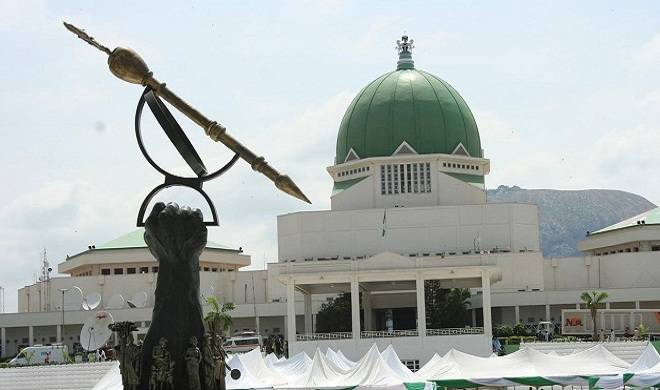Ninth Assembly and overriding national interests
With 20 years experience of democratic governance in Nigeria, the political awareness of the citizens should transcend the ritual of four-year election of political office holders. Elected representatives ought to consult their constituents in other democratic events like the election of National Assembly leadership and the making of annual budgets to give them a sense […]

With 20 years experience of democratic governance in Nigeria, the political awareness of the citizens should transcend the ritual of four-year election of political office holders. Elected representatives ought to consult their constituents in other democratic events like the election of National Assembly leadership and the making of annual budgets to give them a sense of belonging and participation as well as for their needs to be captured.
This has become necessary following our experience in 2015 when some legislators in the National Assembly, rather than being partners with the executive to promote the lives of Nigerians, became ‘enemies’ of Nigerians by holding the executive to ransom through slow passage of budgets and outright refusal to pass requests sent by the executive for selfish political reasons.
As if our bitter experience in the last four years was not enough, these same characters allegedly under the leadership of the Senate President, Bukola Saraki who lost his return bid are now engaged in series of clandestine meetings in an attempt to plant another antagonistic leadership for the assembly that will be totally aggressive and hostile to the president and make things utterly difficult for the executive to accomplish.
There are emerging revelations of unholy unions between some All Progressives Congress (APC) senators and Peoples Democratic Party (PDP) senators to once again repeat the precarious political coup against the ruling APC to fulfil their personal political interests against the collective national interest.
Surprisingly, Senator Ike Ekweremadu is said to be strategizing for the post of deputy senate president after spending 12 solid years on the ‘throne’.
One may wonder why Ekweremadu wants to be deputy senate president again after spending eight years with David Mark and four years with Bukola Saraki. Some pertinent questions that come to bear are; What were the benefits of these years to the nation or his constituency? Or, was he in office all this long for selfish reasons? What value has his 12 years as deputy senate president added to his constituency? How has he used his office for 12 good years to add political value to the PDP? Why is he canvassing for the office again? If it must be a PDP south east senator, why not any other PDP south east senator but him?
I am pretty sure if Senator Ekweremadu were to consult with his constituents over his ambition, they would have kicked against it because his past experiences had never translated into improvement to their lives.
Without fear of contradiction, one can comfortably say Ekweremadu only knows of himself. This style has only placed Nigeria’s democracy in retrogression.
However, the outcome of the just concluded elections gave APC another lead in the two chambers of the National Assembly, thus making it the dominant party in the two chambers. APC must be meticulous, cautious and calculated to come out with a leadership that will ensure smooth executive and legislative relationship that would collectively work for the interest of the nation and Nigerians.
It is therefore obvious that the APC is a major stakeholder and a determinant factor of the National Assembly leadership. The supremacy of the party over legislators who used its platform for elections must be exerted. The party must be exemplary in guiding the legislators towards having patriotic, credible, brilliant, decent people with incontestable integrity to lead the assembly.
It will be ridiculous, shameful and betrayal of trust if APC allows Saraki who was rejected by the Kwara Central electorate to determine who becomes the senate president. The party must enjoy fair control and confidence of the legislators to tow its line in the election of both the senate president and speaker of the House of Representatives.
For any lover of President Muhammadu Buhari and Nigerians, he will not advise the president to sit on the fence in the election of the legislative leaderships. He and his administration had suffered so much sabotage and humiliation from the Saraki led assembly which must be avoided at all costs in the interest of democracy and Nigeria.
The presidency must also show concern for a leadership that will be willing to extend hands of cooperation for a robust relationship so as to execute its policies and programs with speed and ease for the second term of President Muhammadu Buhari to improve the lives of Nigerians as promised during the electioneering campaigns.
Who among the names being mentioned for the senate presidency can effectively support President Buhari’s fight against corruption. Is it Ndume, Ahmad Lawan or Danjuma Goje? A closer look at these characters will reveal the vibrancy of each of them, their commitment to legislation, the party and the federal government. I am not a card carrying member of any political party but as a concerned Nigerian, l am worried about who should preside over the legislation that affects my life and other Nigerians. There is no gain saying that some have exhibited exemplary leadership qualities as leaders of the senate, and the wealth of experience spanning over 20 years of vibrant legislation has consistently served as a supporting pillar for the party and government and should stand out.
Ishaq sent this piece from Q15, Ogbomosho Street, Ibadan
